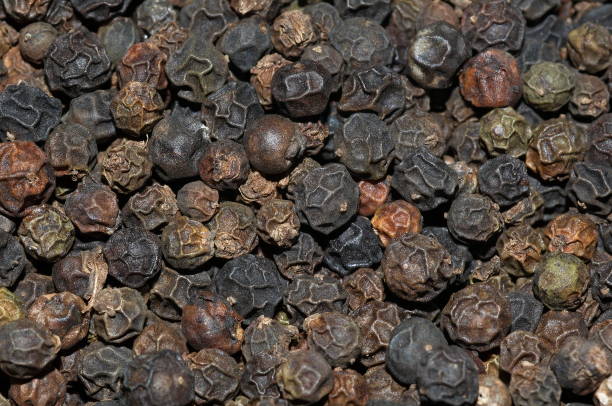Piperine in Black Pepper: Benefits & Piperine Supplements
Unlocking the Power of Piperine: The Black Pepper Extract That’s Taking Supplements by Storm
Piperine, the bioactive alkaloid found in black pepper, is far more than just a kitchen spice. It’s gaining recognition in the world of health and wellness for its powerful antiinflammatory, antioxidant, and even anti-cancer properties.
Whether you're interested in enhancing nutrient bioavailability or exploring natural therapies for inflammation or cancer cell inhibition, piperine supplements offer a wealth of possibilities.
This article is worth reading because it dives deep into the science behind pepper and piperine, the potential health effects, and the emerging therapeutic applications.
Whether you're a curious health enthusiast or looking for natural wellness solutions, this comprehensive guide will explain why this simple compound found in black pepper is making waves in the supplement industry.
Outline of Topics We’ll Cover:
- What Is Piperine and Why Is It Important?
- What Is Piperine’s Role in Anti-Inflammatory Health?
- How Piperine Affects Cancer Cells: What Science Says
- How Does Piperine Boost Nutrient Bioavailability?
- Is Piperine Effective When Taken as a Supplement?
- Are There Side Effects or Risks with Piperine?
- Piperine in Traditional Medicine: What’s the History?
- How Much Piperine Should You Take? Understanding Dosage
- What’s the Difference Between Piperine and Curcumin?
- Can Piperine Be Combined with Other Treatments Like Docetaxel?
1. What Is Piperine and Why Is It Important?
Piperine is an alkaloid compound present in black pepper (Piper nigrum) and long pepper (Piper longum). It’s responsible for the pungency or spicy kick of the taste of pepper.
But more importantly, piperine is the main bioactive component of pepper spice and is increasingly recognized for its many pharmacological properties.
In terms of chemical function, piperine is an alkaloid with potential therapeutic effects.
Scientists have found that piperine may influence biological pathways related to inflammation, oxidative stress, and cancer proliferation. The activities of piperine range from inhibiting enzymes to influencing neurotransmitter levels.
2. What Is Piperine’s Role in Anti-Inflammatory Health?
One of the most researched areas is piperine's antiinflammatory effect.
Multiple studies have shown that piperine reduced cytokine production, a key marker of inflammation, and helped alleviate airway hyperresponsiveness by suppressing T cell activity.
This highlights piperine's anti-inflammatory effects, especially in respiratory and immune-related conditions.
In animal studies, piperine pretreatment decreased swelling and redness in inflammation models. Moreover, the therapeutic effects of natural piperine in piperine in rats trials underline its protective effects against inflammation-driven diseases.
3. How Piperine Affects Cancer Cells: What Science Says
When it comes to cancer, research into piperine treatment is highly promising. Piperine inhibited the growth of various cancer cell lines, including breast cancer, colon, and prostate cancers.
A study found that piperine suppressed overexpressing breast cancer cells, making it a potential natural anti-cancer agent.
The co-administration of piperine and docetaxel has shown remarkable results in oncology. The piperine and docetaxel results suggest that this combination could improve the efficacy of traditional chemotherapy.
Indeed, the influence of co-administration of piperine on the pharmacokinetic profile of cancer drugs is being closely studied in both in vitro and in vivo evaluation models.
4. How Does Piperine Boost Nutrient Bioavailability?
Perhaps one of the most celebrated functions of piperine is its ability to enhance the bioavailability of other nutrients. Due to its action on digestive enzymes and metabolism, piperine can also increase the absorption of compounds like curcumin, which otherwise have poor solubility in the body.
The co-administration of piperine on pharmacokinetic parameters has led to significantly improved blood levels of many supplements and drugs.
In one trial, piperine increased the absorption of curcumin by up to 2,000%. This is why piperine is a potent inhibitor of certain enzymes, allowing more of the co-administered nutrient to stay active in the body longer.
5. Is Piperine Effective When Taken as a Supplement?
Yes, when taken in correct doses, piperine supplements are highly effective.
Clinical studies and reviews, including those published in Reviews in Food Science, highlight the efficacy of piperine as a bioavailability enhancer and therapeutic compound.
Isolated piperine, especially when derived from black pepper, retains most of its physiological effects.
However, the administration of piperine should be done with care, as high amounts of piperine could interfere with certain medications due to its enzyme-blocking properties.
6. Are There Side Effects or Risks with Piperine?
While generally considered safe in moderate quantities, excessive intake of piperine may lead to toxic effects.
Animal studies show that extremely high levels may impact liver enzymes or gut flora.
Piperine would need to be consumed in very high concentrations for this to occur, which is unlikely with culinary use but possible through supplements.
People taking medications, especially those metabolized by the liver, should consult with a healthcare provider due to piperine's potent inhibitor role.
Because piperine is known to affect how drugs are absorbed, it can either amplify or reduce their intended effect.
7. Piperine in Traditional Medicine: What’s the History?
For centuries, black pepper and long pepper have been used in traditional medicine, especially in Ayurvedic and Chinese systems.
These piper species were used to treat digestive issues, respiratory disorders, and even reproductive health problems.
The component of pepper spice exerts therapeutic effects that ancient healers may not have fully understood but valued deeply.
Modern science is catching up to validate these traditional uses, particularly focusing on the health effects of piperine from black pepper and piper longum.
8. How Much Piperine Should You Take? Understanding Dosage
There is no universal dose of piperine that works for everyone, but most supplements range between 5 mg to 20 mg per serving.
This is usually sufficient to elicit the beneficial effects without the risk of toxic effects.
Because piperine may increase the absorption of other compounds, you often find it paired with curcumin in products designed for anti-inflammatory effects or antioxidant effects.
Always look for trusted brands and consider how containing piperine formulations fit into your existing regimen.
9. What’s the Difference Between Piperine and Curcumin?
Both curcumin (from turmeric) and piperine (from black pepper) are known for their antiinflammatory properties, but they work in different ways.
While curcumin directly reduces inflammatory markers and acts as an antioxidant, piperine potentiates its effect by increasing its bioavailability.
They’re often used alone or in combination in supplements. Studies also show that the effects of curcumin are far more pronounced when piperine analogs are present.
If you're taking curcumin, make sure it's paired with piperine for maximum effectiveness.
10. Can Piperine Be Combined with Other Treatments Like Docetaxel?
Yes. The co-administration of piperine and docetaxel is being studied for its potential to enhance chemotherapy outcomes.
In particular, docetaxel results in improved cancer treatment efficacy when paired with piperine.
Researchers believe this is due to piperine’s inhibitory activity on certain drug-metabolizing enzymes.
The presence of piperine may extend the time cancer-fighting agents stay active in the body, increasing their ability to fight tumor cell growth.
Summary: Key Takeaways About Piperine
- Piperine is the main active compound found in black pepper and long pepper.
- It’s an alkaloid known for antiinflammatory, antioxidant, and anti-cancer properties.
- Piperine may enhance nutrient bioavailability, especially for curcumin.
- Piperine supplements are effective and widely used in modern natural medicine.
- Piperine inhibited inflammation and slowed cancer cell growth in studies.
- The administration of piperine with other drugs can alter their pharmacokinetic profile.
- Traditional medicine has long used piper species for various therapeutic effects.
- Proper dose of piperine is essential to avoid potential toxic effects.
- Combining pepper and piperine with other compounds enhances their health effects.
- Scientific reviews in food science back the beneficial effects of piperine treatment.
Works Cited
- Srinivasan, K. “Black Pepper and Its Pungent Principle-Piperine: A Review of Diverse Physiological Effects.” Critical Reviews in Food Science and Nutrition, vol. 47, no. 8, 2007, pp. 735–748.
- Mujumdar, A. M., Dhuley, J. N., et al. “Anti-inflammatory Activity of Piperine.” Planta Medica, vol. 56, no. 2, 1990, pp. 195–196.
- Shoba, G., et al. “Influence of Piperine on the Pharmacokinetics of Curcumin in Animals and Human Volunteers.” Planta Medica, vol. 64, no. 4, 1998, pp. 353–356.
- Yaffe, P. B., et al. “Piperine, a Bioactive Component of Pepper Spice Exerts Therapeutic Effects in Breast Cancer.” Journal of Cancer Prevention, vol. 20, no. 2, 2015, pp. 118–125.













